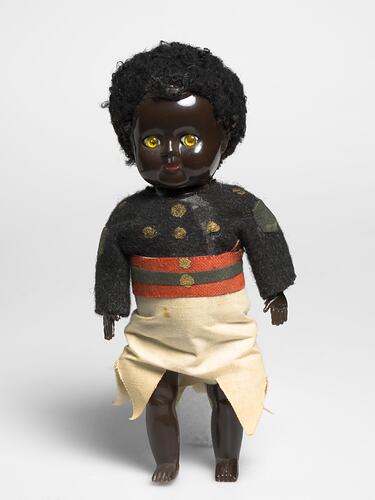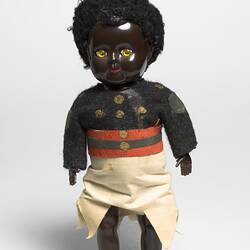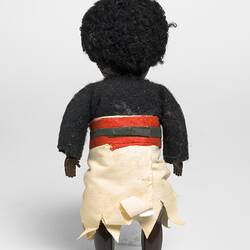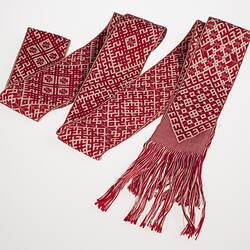Summary
National doll produced to represent a Fijian man, it was given to Monica Gates, circa 1988. The doll is dressed to represent a Fijian policeman, in a white sulu and navy shirt. These uniforms are still worn today by members of the police band when performing. Sulu's may also be worn by Fijian policemen today, particularly for formal dress or if undertaking office work, however pants are commonly worn for everyday police work. Sulu's are traditionally only worn by indigenous Fijian men, not by Indo-Fijian men who tended to dress in pants or shorts, however today many men living in Fiji wear the Sulu.
The Gates collection contains 170 national dolls from 74 different countries and some correspondence relating to the acquisition of several of the dolls. The costumes of the dolls represent national costumes from the 19th Century to the 1990s. Monica Gates collected or was given these dolls between 1957 and 1990.
These dolls were purchased as souvenirs of particular countries and like many mass produced souvenirs they are often not accurate representations of a particular country or region, and may actually better reflect neighbouring counties or regions. This occurs because costumes are often stylised and simplified resulting dolls wearing generic costume elements which are common to many countries/regions. Often the fabrics and decorations used are selected to make the dolls cheap and easy to manufacture and aesthetically pleasing. This can result in the fabrics, colours and decorations of the doll's clothing having little or no reflection of the costume associated with a particular country or region they are meant to be representative of.
Physical Description
A small male doll (black) with curly, black hair and yellow sleeping eyes. The doll wears a cream cotton sulu, which is cut like a crown along the bottom. It wears a black felt blouse with painted gold dots at the shoulder and four points painted on the breast. Around the waist the doll has a red, green belt .
More Information
-
Collecting Areas
Clothing & Textiles, Childhood, Migration & Cultural Diversity
-
Acquisition Information
Purchase
-
Place Made
-
User
-
Other Association (See Comments)
Fiji
Doll is intended to represent a Fijian traffic policeman. -
Classification
-
Category
-
Discipline
-
Type of item
-
overall dimensions
6.5 cm (Length), 4.5 cm (Width), 15 cm (Height)
-
Keywords
Children's Play, Clothing, Cultural Awareness, Cultural Beliefs, Dolls, National Costumes, National Identity, Souvenirs, Pacific Islands, Police



